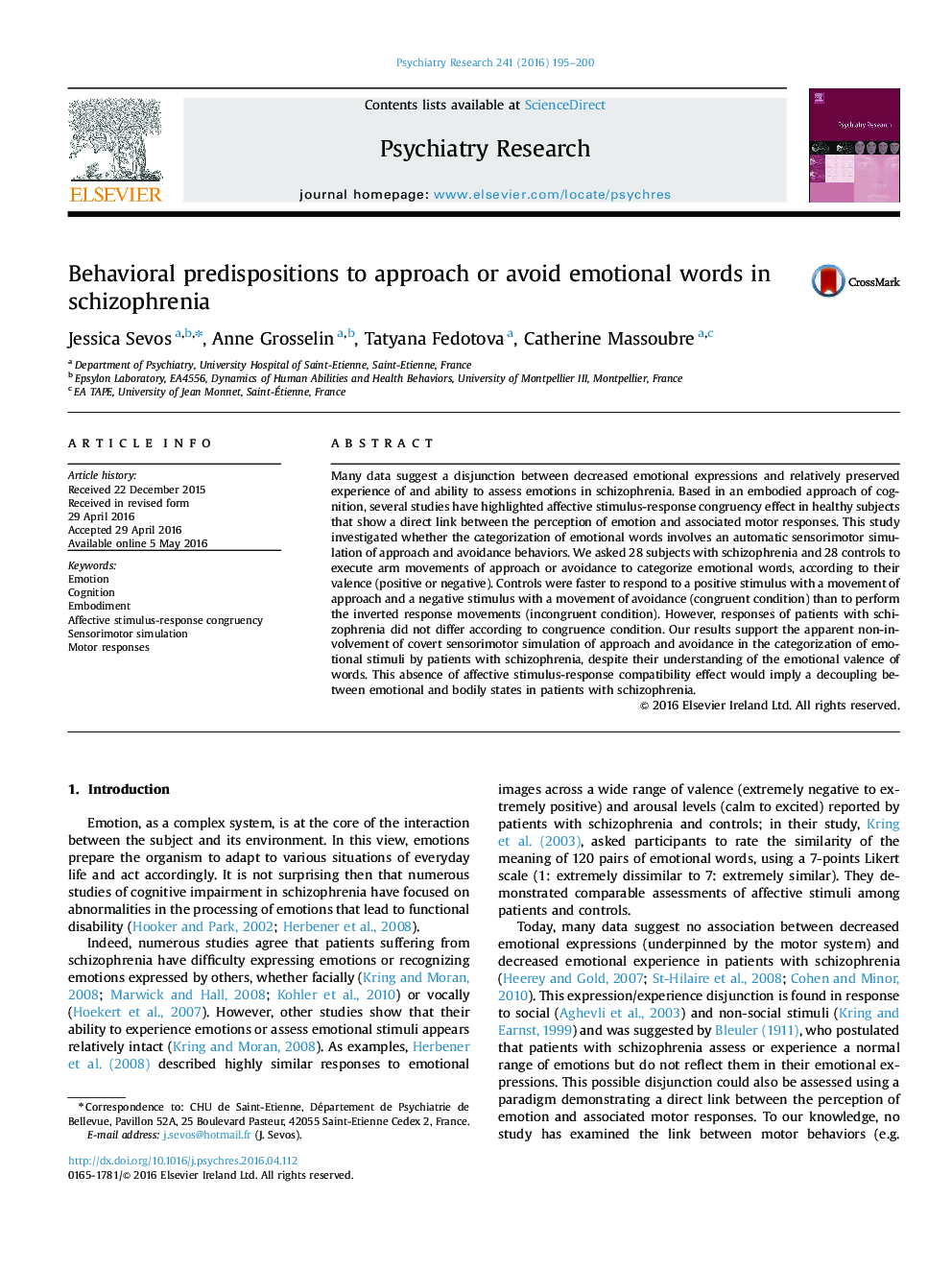| کد مقاله | کد نشریه | سال انتشار | مقاله انگلیسی | نسخه تمام متن |
|---|---|---|---|---|
| 6813102 | 545897 | 2016 | 6 صفحه PDF | دانلود رایگان |
عنوان انگلیسی مقاله ISI
Behavioral predispositions to approach or avoid emotional words in schizophrenia
ترجمه فارسی عنوان
خواسته های رفتاری برای مقابله با کلمات عاطفی در اسکیزوفرنیا
دانلود مقاله + سفارش ترجمه
دانلود مقاله ISI انگلیسی
رایگان برای ایرانیان
کلمات کلیدی
هیجانی، شناخت، تجسم، سازگاری محرک-احساسی مؤثر، شبیه سازی سنسورموتور، پاسخ های موتور،
ترجمه چکیده
بسیاری از داده ها نشان می دهد اختلاف بین کاهش عبارات احساسی و تجربه نسبتا حفظ شده و توانایی ارزیابی احساسات در اسکیزوفرنی است. بر اساس یک رویکرد مفهومی شناختی، مطالعات متعددی تأثیر سازگاری عاطفی مثبت و معنی دار در افراد سالم را نشان می دهد که ارتباط مستقیم بین ادراک احساسات و پاسخ های مرتبط با موتور دارند. این مطالعه به بررسی اینکه آیا طبقه بندی کلمات عاطفی شامل شبیه سازی حسگر حرکت اتوماتیک رفتار و اجتناب از رفتار است. ما از 28 فرد مبتلا به اسکیزوفرنی و 28 کنترل برای انجام حرکات بازوی روانی یا اجتناب از طبقه بندی کلمات عاطفی، با توجه به ولنتاین (مثبت یا منفی) خواسته ایم. کنترل ها سریع تر به پاسخ دادن به یک محرک مثبت با حرکت رویکرد و یک محرک منفی با حرکت اجتناب (شرایط مشترک) نسبت به انجام حرکات پاسخ متقاطع (شرایط نامساعد) سریعتر می شوند. با این حال، پاسخ بیماران مبتلا به اسکیزوفرنیا بر اساس شرایط همسان سازی متفاوت نبود. نتایج ما از عدم مشارکت ظاهری موتورهای حساس حریم خصوصی پنهان از شبیه سازی رویکرد و اجتناب از طبقه بندی محرک های احساسی توسط بیماران مبتلا به اسکیزوفرنی حمایت می کند، به رغم درک آنها از احساسات احساسی کلمات. این عدم وجود سازگاری اثرات محرک-پاسخی منجر به جدایی بین حالت های عاطفی و بدن در بیماران مبتلا به اسکیزوفرنی می شود.
موضوعات مرتبط
علوم زیستی و بیوفناوری
علم عصب شناسی
روانپزشکی بیولوژیکی
چکیده انگلیسی
Many data suggest a disjunction between decreased emotional expressions and relatively preserved experience of and ability to assess emotions in schizophrenia. Based in an embodied approach of cognition, several studies have highlighted affective stimulus-response congruency effect in healthy subjects that show a direct link between the perception of emotion and associated motor responses. This study investigated whether the categorization of emotional words involves an automatic sensorimotor simulation of approach and avoidance behaviors. We asked 28 subjects with schizophrenia and 28 controls to execute arm movements of approach or avoidance to categorize emotional words, according to their valence (positive or negative). Controls were faster to respond to a positive stimulus with a movement of approach and a negative stimulus with a movement of avoidance (congruent condition) than to perform the inverted response movements (incongruent condition). However, responses of patients with schizophrenia did not differ according to congruence condition. Our results support the apparent non-involvement of covert sensorimotor simulation of approach and avoidance in the categorization of emotional stimuli by patients with schizophrenia, despite their understanding of the emotional valence of words. This absence of affective stimulus-response compatibility effect would imply a decoupling between emotional and bodily states in patients with schizophrenia.
ناشر
Database: Elsevier - ScienceDirect (ساینس دایرکت)
Journal: Psychiatry Research - Volume 241, 30 July 2016, Pages 195-200
Journal: Psychiatry Research - Volume 241, 30 July 2016, Pages 195-200
نویسندگان
Jessica Sevos, Anne Grosselin, Tatyana Fedotova, Catherine Massoubre,
